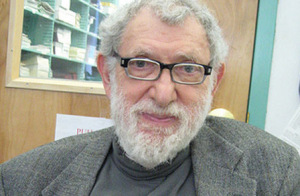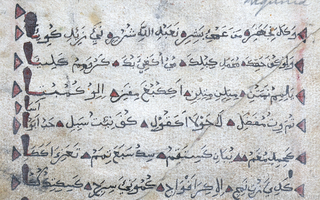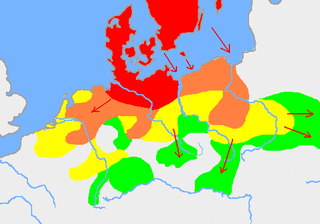Related Research Articles

Rhyming slang is a form of slang word construction in the English language. It is especially prevalent in the UK, Ireland and Australia. It was first used in the early 19th century in the East End of London; hence its alternative name, Cockney rhyming slang. In the United States, especially the criminal underworld of the West Coast between 1880 and 1920, rhyming slang has sometimes been known as Australian slang.

John Kilian Houston Brunner was a British author of science fiction novels and stories. His 1968 novel Stand on Zanzibar, about an overpopulated world, won the 1969 Hugo Award for best science fiction novel, and the BSFA award the same year. The Jagged Orbit won the BSFA award in 1970.

A nursery rhyme is a traditional poem or song for children in Britain and many other countries, but usage of the term only dates from the late 18th/early 19th century. The term Mother Goose rhymes is interchangeable with nursery rhymes.

Poetry is a form of literature that uses aesthetic and often rhythmic qualities of language—such as phonaesthetics, sound symbolism, and metre—to evoke meanings in addition to, or in place of, the prosaic ostensible meaning.
A rhyme is a repetition of similar sounds in the final stressed syllables and any following syllables of two or more words. Most often, this kind of perfect rhyming is consciously used for artistic effect in the final position of lines within poems or songs. More broadly, a rhyme may also variously refer to other types of similar sounds near the ends of two or more words. Furthermore, the word rhyme has come to be sometimes used as a shorthand term for any brief poem, such as a nursery rhyme or Balliol rhyme.
Nadsat is a fictional register or argot used by the teenage gang members in Anthony Burgess's dystopian novel A Clockwork Orange. Burgess was a linguist and he used this background to depict his characters as speaking a form of Russian-influenced English. The name comes from the Russian suffix equivalent of "-teen" as in "thirteen". Nadsat was also used in Stanley Kubrick's film adaptation of the book.

Word play or wordplay is a literary technique and a form of wit in which words used become the main subject of the work, primarily for the purpose of intended effect or amusement. Examples of word play include puns, phonetic mix-ups such as spoonerisms, obscure words and meanings, clever rhetorical excursions, oddly formed sentences, double entendres, and telling character names.
In literature, alliteration is the conspicuous repetition of identical initial consonant sounds in successive or closely associated syllables within a group of words, even those spelled differently. As a method of linking words for effect, alliteration is also called head rhyme or initial rhyme. For example, "humble house," or "potential power play." A familiar example is "Peter Piper picked a peck of pickled peppers". "Alliteration" is from the Latin word littera, meaning "letter of the alphabet"; it was first coined in a Latin dialogue by the Italian humanist Giovanni Pontano in the 15th century. Alliteration is used poetically in various languages around the world, including Arabic, Irish, German, Mongolian, Hungarian, American Sign Language, Somali, Finnish, Icelandic.
"Eeny, meeny, miny, moe"—which can be spelled a number of ways—is a children's counting rhyme, used to select a person in games such as tag, or for selecting various other things. It is one of a large group of similar rhymes in which the child who is pointed to by the chanter on the last syllable is either "chosen" or "counted out". The rhyme has existed in various forms since well before 1820 and is common in many languages with similar-sounding nonsense syllables.
Cynewulf is one of twelve Old English poets known by name, and one of four whose work is known to survive today. He presumably flourished in the 9th century, with possible dates extending into the late 8th and early 10th centuries.

Elckerlijc is a morality play from the Low Countries which was written in Dutch somewhere around the year 1470. It was first printed in 1495. The play was extremely successful and may have been the original source for the English play Everyman, as well as many other translations for other countries. The authorship of Elckerlijc is attributed to Peter van Diest, a medieval writer from the Low Countries.

A children's song may be a nursery rhyme set to music, a song that children invent and share among themselves or a modern creation intended for entertainment, use in the home or education. Although children's songs have been recorded and studied in some cultures more than others, they appear to be universal in human society.

John Hollander was an American poet and literary critic. At the time of his death, he was Sterling Professor Emeritus of English at Yale University, having previously taught at Connecticut College, Hunter College, and the Graduate Center, CUNY.
Caló is an argot or slang of Mexican Spanish that originated during the first half of the 20th century in the Southwestern United States. It is the product of zoot-suit pachuco culture that developed in the 1930s and '40s in cities along the US/Mexico border.
Tucker is a surname of disputed origin.

Luis d'Antin van Rooten was a Mexican-born American actor.

Utend̠i wa Tambuka, also known as Utenzi wa Tambuka, Utenzi wa Hirqal or Kyuo kya Hereḳali, is an epic poem in the Swahili language, dated 1728. It is one of the earliest known documents in Swahili.

Cornelus Bernardus "Kees" Rijvers is a Dutch former footballer who was active as a midfielder and later as coach for o.a PSV Eindhoven and the Dutch national team. He was born in Breda.

Gothic is an extinct East Germanic language that was spoken by the Goths. It is known primarily from the Codex Argenteus, a 6th-century copy of a 4th-century Bible translation, and is the only East Germanic language with a sizeable text corpus. All others, including Burgundian and Vandalic, are known, if at all, only from proper names that survived in historical accounts, and from loanwords in other languages such as Portuguese, Spanish, and French.

Ramakrushna Nanda was an Indian writer, educator and author of children's literature. He composed the song Ahe Dayamaya Biswa Bihari, a favourite of Mahatma Gandhi when Gandhi was at Sabarmati Ashram. This song was included in his Odia-language textbook Sahitya Sopana.